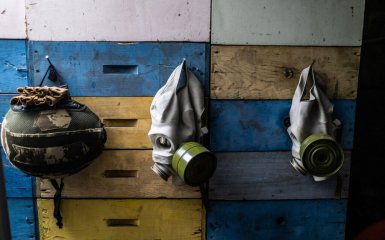Illegitimate Russian President Vladimir Putin is possibly testing the world's reaction to the violation of the ban on the use of chemical weapons.
Putin tests Western reaction before large-scale use of chemical weapons in Ukraine
The Russian army has been sporadically using non-lethal chemical weapons on the frontline in Ukraine, making it easier for itself to chew through Ukrainian defences.
If the world does not give a decisive and tough answer to this, Russia will move to a more large-scale and deadly use of chemical weapons, believes Emma Nix, assistant director of the "European Center" at the American think tank Atlantic Council.
For years, Ukrainians have been raising the alarm about Russian use of chemical weapons, and last week the US State Department finally confirmed these claims and announced new sanctions against Russians involved in chemical and biological weapons programmes.

Emma Nix
Assistant director with the Atlantic Council's Europe Center
Emma Nix noted that historically, chemical weapons have been used to break a stalemate on the frontline, weakening enemy forces on the front line and opening the way for advancement. According to the analyst, Russia's use of chemical weapons may indicate that Russian strategists consider the situation to be a stalemate and are trying to break it.
Currently, the Russians are using chloropicrin, a chemical agent that some countries use to combat mass street riots. Although this substance is non-lethal, the Chemical Weapons Convention explicitly states that the use of chemicals intended to combat street riots on the battlefield is unacceptable. And Russia is a signatory to this Convention.
Given the Kremlin's willingness to violate the Chemical Weapons Convention, the choice of a non-lethal substance can be seen as a test of the reaction to this violation of humanitarian law. Emma Nix is convinced that in this situation, Putin's goal is not to maximise the deaths of Ukrainian soldiers, but to test the international response and try to determine how far he can go.
Therefore, a strong response from the international community is vital to send a clear message that the widespread use of chemical weapons is completely unacceptable and will not be tolerated. (...) Failure to deter the use of chemical weapons in Ukraine will have catastrophic consequences for both Ukrainians and international security as a whole.
Since sanctions are unlikely to deter the Kremlin, and the West will not dare to launch missiles at chemical weapons producers in Russia, Emma Nix believes that the best response available to the United States and its allies is to provide Ukraine with long-range weapons and intelligence support to enable Ukrainians to strike chemical weapons facilities with their own hands.
Russia is using chemical weapons on the frontline in Ukraine
Russians have been using chemical weapons throughout the war. Ukrainian soldiers told The Telegraph that in some parts of the frontline, Russians are dropping tear gas and other chemicals on Ukrainian positions almost daily.
Last week, the United States officially accused Russia of violating the international ban on chemical weapons and using the chemical agent chlorpicrin against Ukrainian troops.
The United States also imposed sanctions on a number of Russians and Russian companies involved in chemical weapons.
What was discovered about the use of chemical weapons in Ukraine
The Organisation for the Prohibition of Chemical Weapons has stated that it has no unequivocal evidence of the use of chemical weapons in Russia's war against Ukraine.
As noted, the information available to the OPCW secretariat, with the help of which Russia and Ukraine are trying to prove the use of banned chemicals by the other side, does not sufficiently substantiate the relevant accusations.
Nevertheless, the organisation declares an ‘unstable situation’ and recognises the ‘possible’ use of toxic chemicals as weapons.
More on the topic
- Category
- Ukraine
- Publication date
- Додати до обраного


